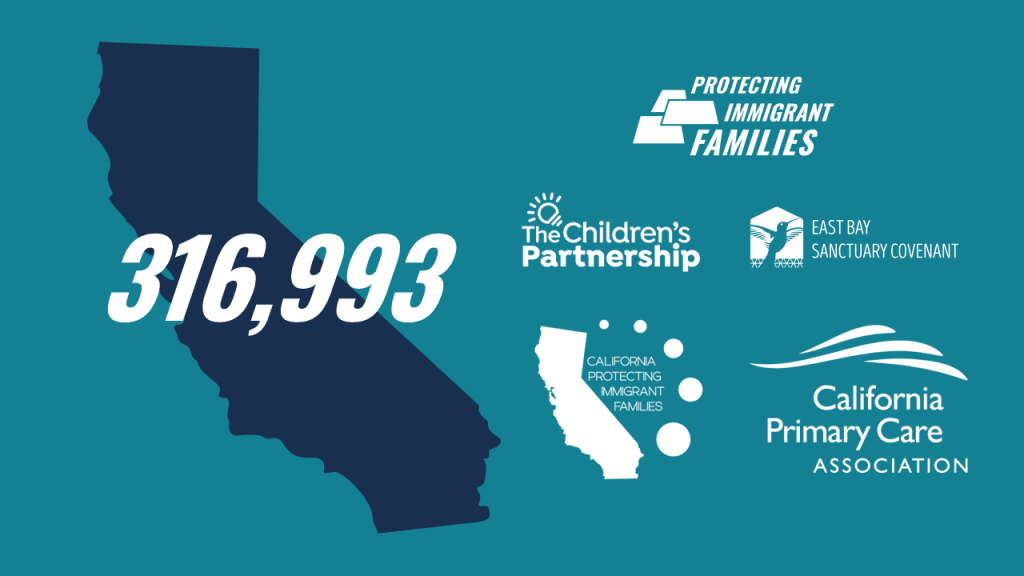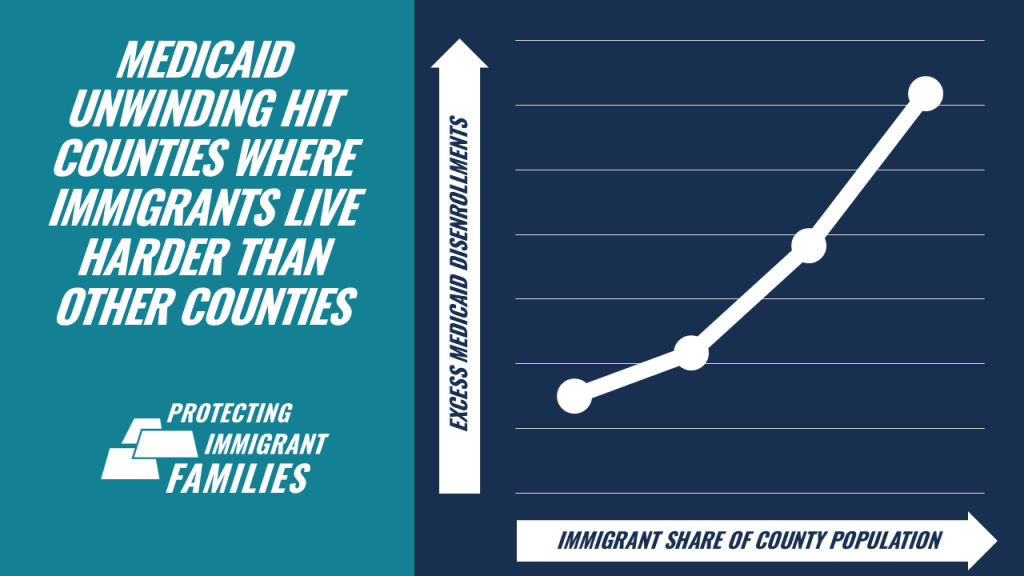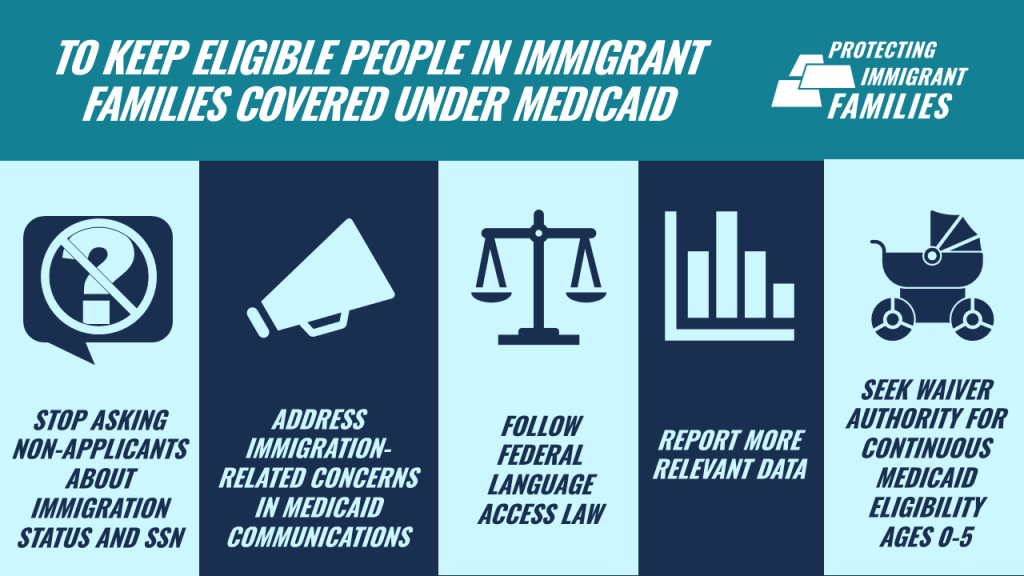FOR IMMEDIATE RELEASE
October 8, 2024
CONTACT: Ed Walz, ed@pifcoalition.org, 202-374-8872
EXCESS MEDICAID LOSSES AFFECTED 317,000 PEOPLE IN CALIFORNIA COUNTIES WITH LARGER IMMIGRANT COMMUNITIES HARDER, REPORT FINDS

EL PASO, Texas — A new analysis released today by the Protecting Immigrant Families coalition (PIF) finds that state Medicaid eligibility policies and practices resulted in 316,993 people in California counties with larger immigrant shares of county population losing Medicaid, compared to counties with a lower share of immigrants. The analysis, completed for PIF by the non-profit behavioral science research firm ideas42, focuses on declines in Medicaid enrollment as states worked to “unwind” Medicaid’s pandemic-era continuous coverage requirement.
“State and federal failures to lower the barriers facing immigrant families have denied more than a million people health care access under Medicaid. And because immigrant families are largely families of color, these failures are widening racial health disparities.
Adriana Cadena, director of PIF

The PIF/ideas42 analysis compared state-published Medicaid enrollment data for counties with larger (as high as 36%) average immigrant shares of county population against disenrollments for counties with the smallest (averaging less than 4%) immigrant population shares. The analysis focused on states with relatively large immigrant shares of state population: Arizona, California, Colorado, Florida, Michigan, New Jersey, New York, North Carolina, Pennsylvania, and Texas. These 10 states include 50% of the total U.S. population and 68% of the foreign-born population. Most states were not included in the study because they did not report county-level data, so the nationwide impact is likely much greater than the 1.37 million people cited by the research.
The research finds a correlation between state Medicaid disenrollment and immigrant share of county population. Counties with the “highest” immigrant shares of county population accounted for about half (617,520 or 45%) of additional Medicaid coverage losses. Counties with a “high” immigrant share of county population accounted for an additional nearly 30% (383,119 or 28%).
“Our results indicate that high immigrant share communities have lost Medicaid coverage at substantially higher rates than counties with low immigrant shares. After an unprecedented increase in insurance coverage during the pandemic, more people today—especially in immigrant communities—face unnecessarily complex eligibility requirements and struggle to obtain and afford healthcare,” said Jeremy Barofsky, who led the analysis as Director of Research and Evaluation at ideas42.
The analysis also shows that Texas performed the worst at mitigating Medicaid coverage losses. In Texas, counties with the highest immigrant share had a drop in enrollment that was nearly five percentage points higher (totaling more than 460,000 people) than the counties with the lowest immigrant share. In California, this difference was only 2.5 percentage points.
Before Medicaid unwinding began, PIF developed a set of policy recommendations to mitigate known barriers to keeping eligible people in immigrant families covered. Subsequent research by PIF and partner organizations found that states had largely failed to implement these best practices. PIF shared its findings with the U.S. Centers for Medicare and Medicaid Services (CMS) in November, urging CMS to require states to address performance shortfalls. California proactively implemented many of these strategies, including streamlining the renewal process, and working with community partners.
Even though California performed better than other immigrant-rich states, the sheer size of our population underscores the critical importance of doing all we can to keep California children and families covered by implementing policy changes like continuous coverage for young children.
Mayra E. Alvarez, president of The Children’s Partnership
Nearly half of California’s 9 million children are part of immigrant families, making Medi-Cal disenrollments that lead to gaps in coverage even more concerning. As we’ve heard from many families around the state over the past year, the Medi-Cal unwinding process has been problematic, especially for people seeking help with renewals in languages other than English. Keeping coverage requires a program that works for all who depend on it, and we can do more to strengthen Medi-Cal for all families.

“The findings from the PIF study highlights some promise, but also serves as a reminder that our work is not complete,” said California Primary Care Association (CPCA) President and CEO Francisco J. Silva, Esq. “One of CPCA’s top priorities has been to secure state funding for Health Enrollment Navigators to ensure that all Medi-Cal eligible Californians, including the one in three Medi-Cal members served by community health centers, successfully retain their Medi-Cal coverage. CPCA Advocates was able to secure $20 million in funding allowing community health center grantees to perform critical outreach and enrollment services ensuring that income eligible individuals keep their Medi-Cal health coverage. Although California’s disenrollment numbers are high, the smaller percentage decline in Medicaid enrollment when compared to other states shows that California’s strategies and partnerships have had a significant impact and must be continued. We will continue to work with key state and federal stakeholders to invest the resources needed to ensure that all individuals, regardless of immigration status, have meaningful access to care.”
###
The Children’s Partnership (TCP) is a California-based children’s policy and advocacy organization committed to advancing child health equity through public policy, research and community engagement. TCP envisions a California where all children—regardless of their race, ethnicity or place of birth—have the resources and opportunities they need to grow up healthy and thrive. Learn more at childrenspartnership.org.
